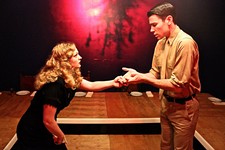All Over Creation: So Little, So Much
When it comes to the theatrical, the smart choice is to go bare
By Robert Faires, Fri., Oct. 7, 2011
Do I really need to tell you what the crowd at the B. Iden Payne Theatre thought of this bit of stage trickery? They were delighted – like children witnessing a magic act. And indeed, this was, to borrow Prospero's words, "art to enchant": a transformation occurring before the viewers' eyes, not with the aid of stage hydraulics or a trick of the light but with only an actor's skill and the audience's belief in the metamorphosis taking place.
That belief, of course, is key to the whole enterprise. The engine that drives theatre is metaphor – people and settings and things being something other than what they truly are. But it can't run unless audiences fuel it with their acceptance of theatre's symbolic essence, their willing participation in the establishment of illusion. Fortunately for those of us who work on the stage, people are still happy to do that. And that won't go away, I believe. The conspiracy between artist and audience to pretend that something fake is real distinguishes theatre from other dramatic art forms and will keep it alive in the face of film, television, video, and whatever new delivery systems for drama may develop. The stage is the only place where audiences can get that rush of make-believe so directly. Actors From the London Stage grasps that, and the troupe's stripped-down productions – bare stage, street clothes, five actors filling multiple roles – play to that. Their naked theatricality gets to the heart of the form.
That's not a knock on theatrical design – "Some of my best friends are designers," the writer hastens to add. I think back on Rappahannock County, to name one recent production I enjoyed, and my experience of this new musical theatre work set during the Civil War was enriched considerably by Jessica Jahn's authentic period costumes and the imagery from the era that Wendall K. Harrington projected behind the action. But you still had just five singers portraying 30 characters and only a few set elements, some of which were used in different ways for different scenes. Composer Ricky Ian Gordon, lyricist Mark Campbell, and director Kevin Newbury left plenty of room for those of us watching to create that reality on the stage. They trusted the audience.
I've lost count of the number of theatre productions I've seen where a company has sought to create settings or costumes that looked realistic but lacked the resources to realize them properly. It put up walls that shuddered and doors without frames, stocked supposedly swanky homes with threadbare sofas and thrift-store art, or tried to pass off modern loafers as Regency footwear. Too often, this just looks disappointingly cheap and shoddy, but what's even more disheartening to me is that it signals a lack of faith in the audience from the theatre artists. They'd rather try to fool the audience into seeing their theatrical world with a poor representation than trust the audience members to imagine it for themselves. Such companies appear to think that any costume or set, no matter the quality, is a boon to their patrons. But in theatre, as in so many other parts of life, less is more. The smarter choice, the bolder choice, the choice the audience wants, is to strip down, theatrically speaking, and go bare.








